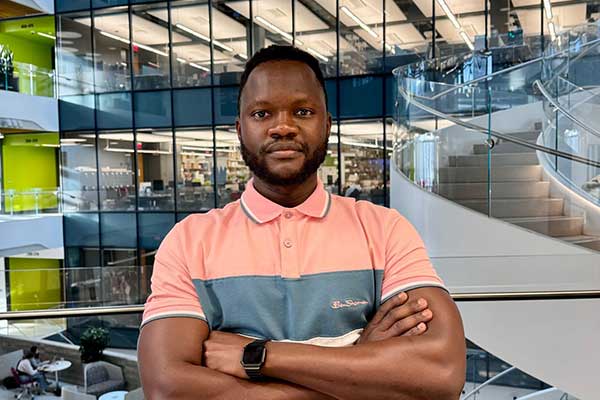A Student’s Personal Experiences Inspired Their Career Aspirations

Emmanuel Amoako, MS’25, bioengineering with a concentration in biomedical devices and bioimaging, used his personal experiences from living in Ghana as a driving force to begin developing accessible, low-cost medical devices for low-resource countries. His passion for helping the community, mixed with his co-op experience and research opportunities, has allowed him to jump into the field of bioengineering and make an impact on the world.
Emmanuel Amoako, a student in the Master of Science program in bioengineering with a concentration in biomedical devices and bioimaging, attributes his passion for creating medical devices to his firsthand experiences growing up in Ghana. Amoako’s curiosity for developing medical devices began after his brother was involved in a motor accident. His brother needed magnetic resonance imaging for his head after the injury and the closest hospital with an MRI machine was far away from his home. After this experience Amoako started evaluating the need for medical devices in West Africa and realized these devices needed to be more widely accessible in the region.
Amoako went into detail about how most medical devices in Ghana are imported or donated from North America and Europe and are unable to withstand the temperatures in West Africa, ultimately, causing the devices to break down. Amoako described how the nurseries in hospitals for premature infants would only come equipped with a single incubator to house the babies. This was all further proof for him that something needed to be done about the lack of medical devices.
Connecting the Classroom to Real-world Experience
Amoako started his co-op experience in July 2024 at Gluakos Corporation, a company that specializes in creating devices to help treat glaucoma, corneal disorders, and retinal diseases. During the first part of his co-op, his team was working to develop a new medical device used to detect early stages of keratoconus, a disease that affects the cornea. Amoako has continued to work at Gluakos and is currently working with them to develop a low-cost version of an optical coherence tomography device. He has helped the team develop the concept and build the prototype of the device. Amoako has enjoyed being able to take what he has learned in the classroom and apply it to creating something he is passionate about.
“I’ve learned the theory aspects in the classroom; I know equations and all that. In reality, I’ve never applied it, I didn’t know how useful it was. Co-op gave me that opportunity to be able to integrate my classroom experience with the industry.”
In addition to working at Gluakos as a research intern, Amoako works with COE Distinguished Professor Mark Niedre on research. Amoako got involved in Professor Niedre’s research lab after taking his “Biomedical Imaging” course and becoming fascinated by the curriculum. The research entails diffusing light in mice to fluorescently detect and count circulating tumor cells (CTCs) in the bloodstream without having to draw blood. By detecting cancerous cells and studying how they spread, they hope to help clinicians be able to detect cancer sooner in the body. Amoako has been grateful to be a part of this research and says his experience in the lab has helped shape him for his future endeavors.
Giving Back to the Community
Before coming to Northeastern, in Ghana, Amoako was a part of an organization called Innovators for Global Health, which helps provide and develop low-cost medical devices for countries without access to them. He became extremely interested in the club’s goals and values and decided to continue his involvement when he came to Northeastern and joined the university’s chapter of the organization. In Ghana, Amoako would scout to find problems in West Africa and see where the need for medical devices was most prominent. In 2023 and 2024, the group was helping to design postural beds for hospitals in Ghana. At home, Amoako also helped design smaller devices used to detect body temperature and in his final year of undergraduate studies undertook a project developing infant incubators for rural health care centers.
Future Perspective
Amoako is planning to graduate from the bioengineering master’s program in December of 2025. The projects he has worked on during his time at Gluakos Corporation and his research with Professor Mark Neidre are very similar to the work he wishes to pursue after graduating. Due to his experiences at home and his passion for helping the community, Amoako in the future hopes to make inexpensive, accessible medical devices for people living in low-resource countries.
As Amoako reflected on his time in the program he gave some pieces of advice for those considering pursuing a master’s degree in bioengineering. There were three important attributes he believes someone should possess to be successful in this field of work. First, believing in yourself, especially believing you have the ability to contribute to something larger is a huge aspect of being able to be successful during projects. Second, being hardworking and thirdly, having a curious mind is always an advantage. Amoako said it is crucial to try to be curious about everything and everyone you come into contact with. He believes you can gain vast knowledge from asking questions and you can apply that knowledge to all your future work.